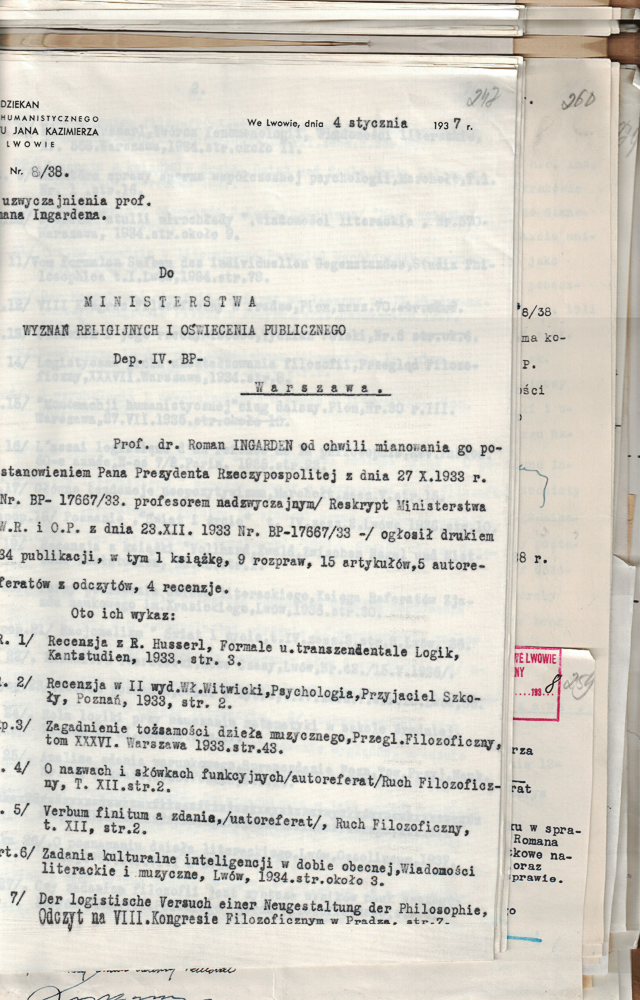
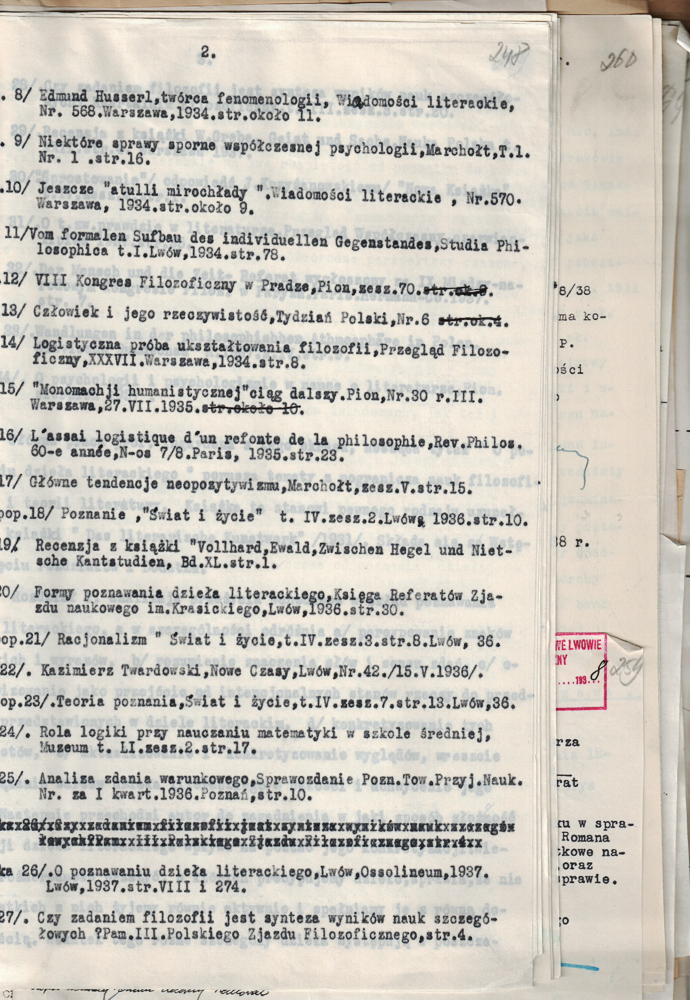
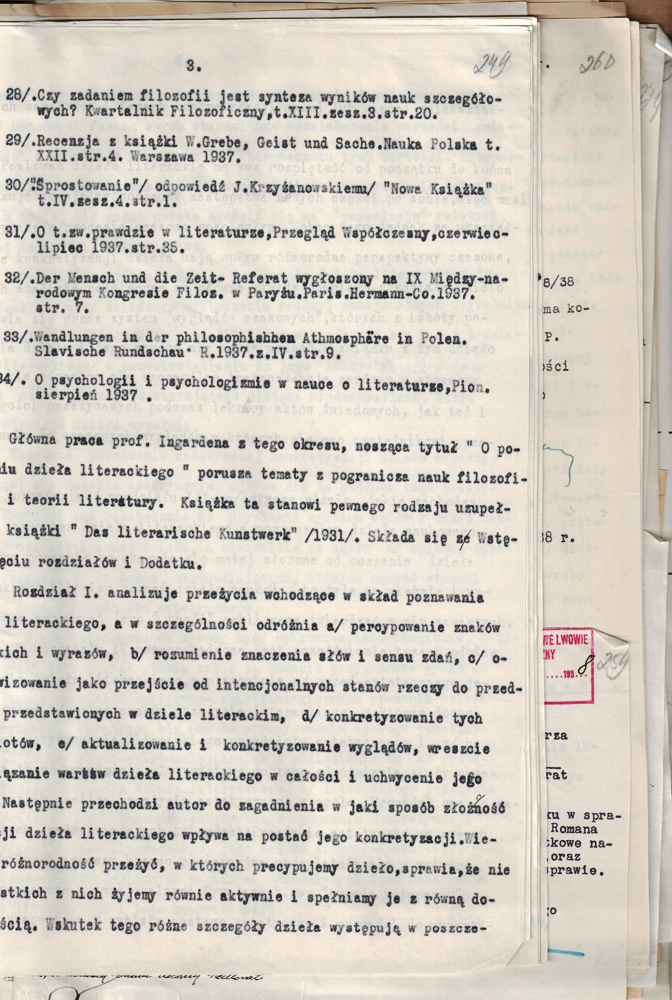
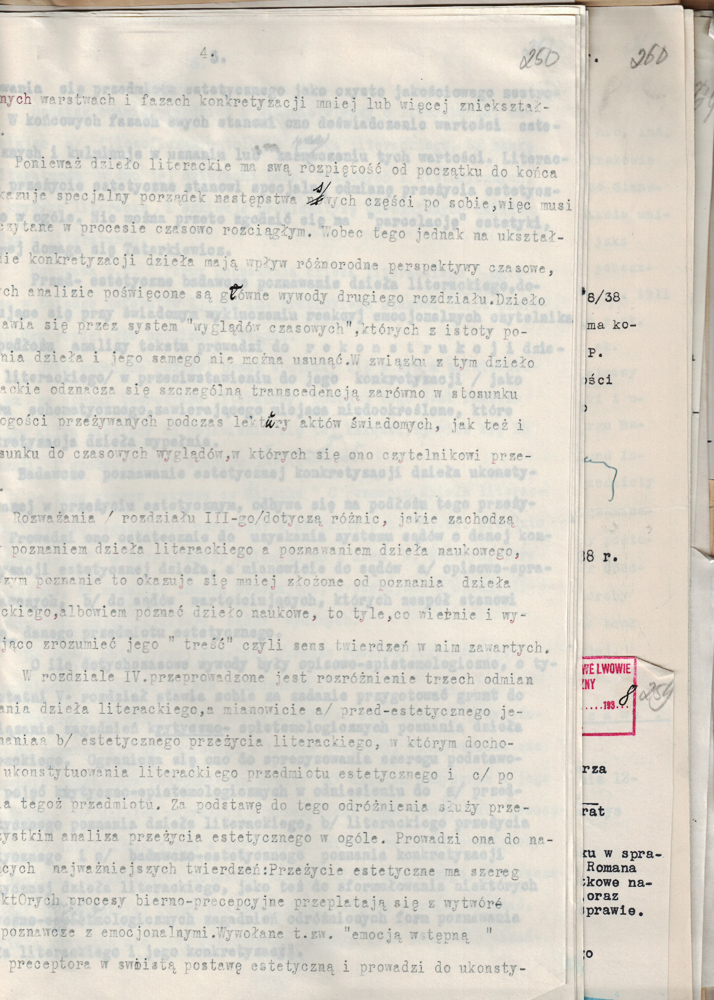
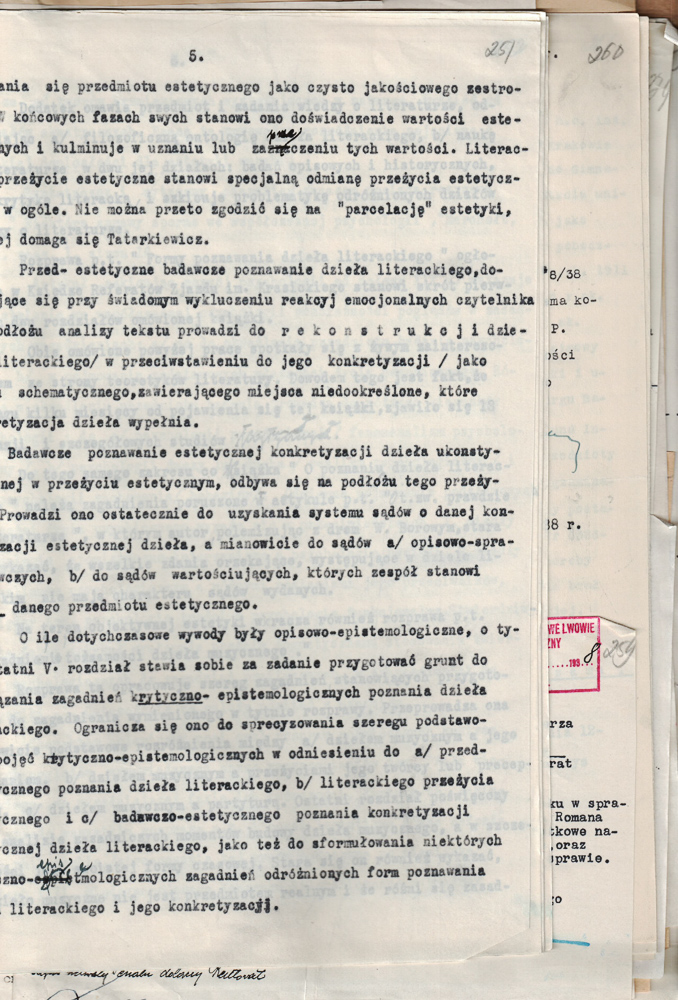
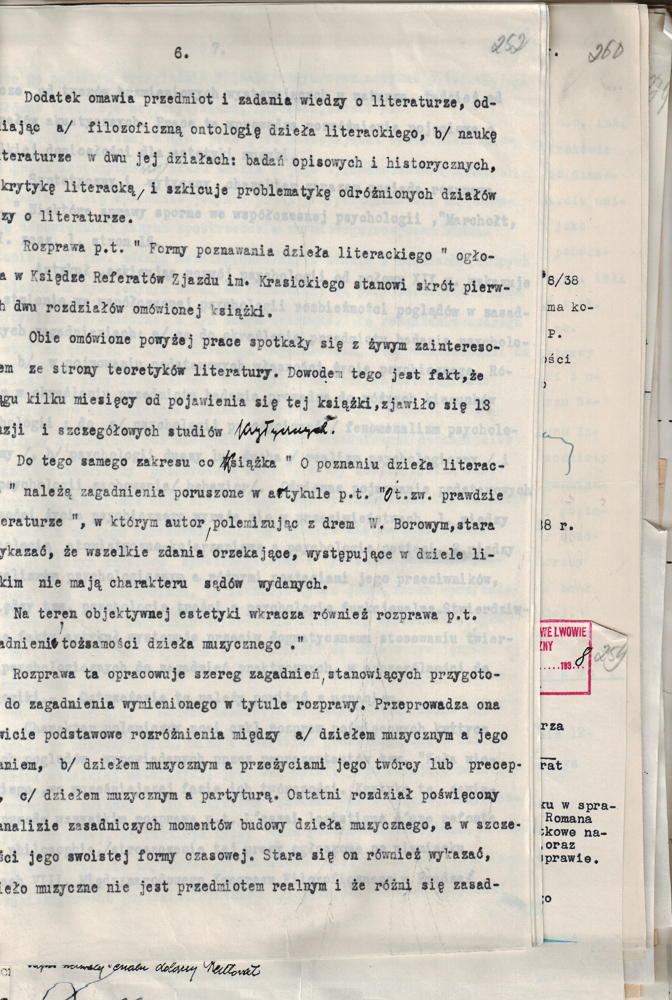
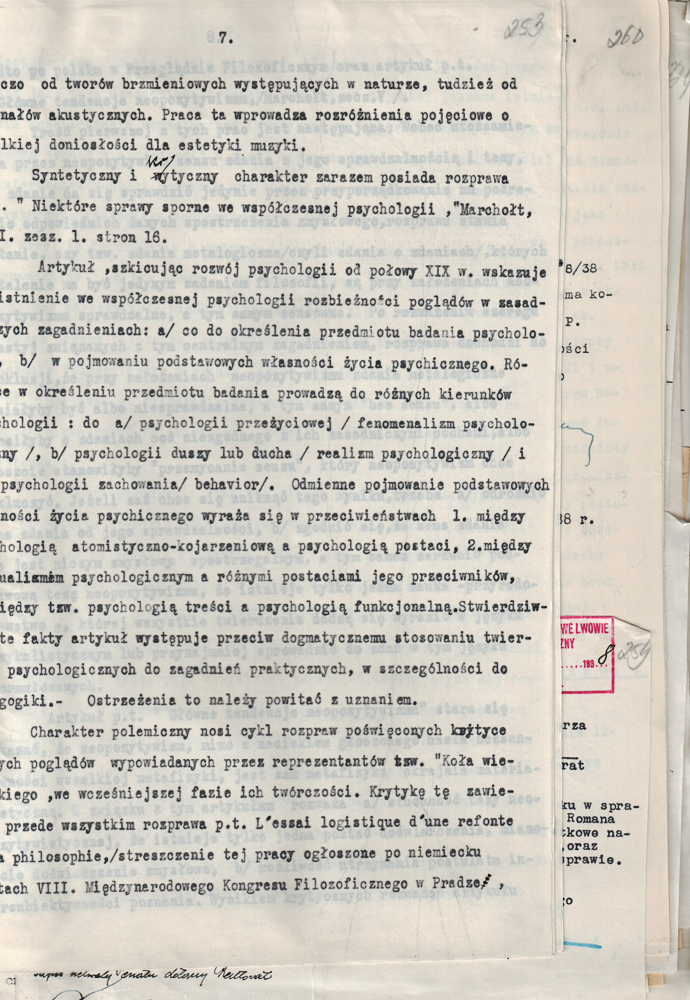
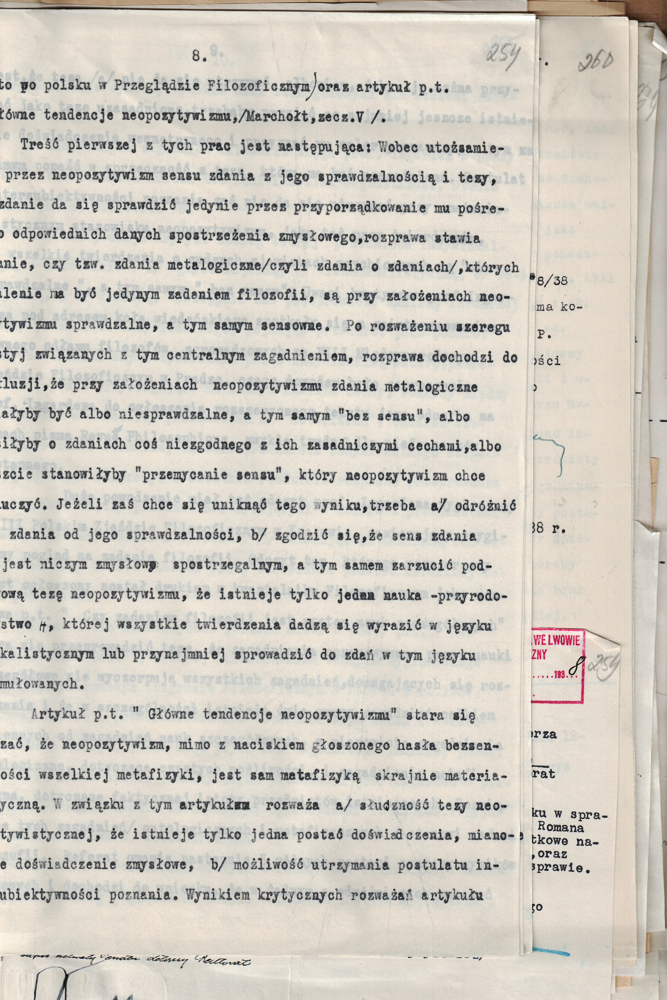
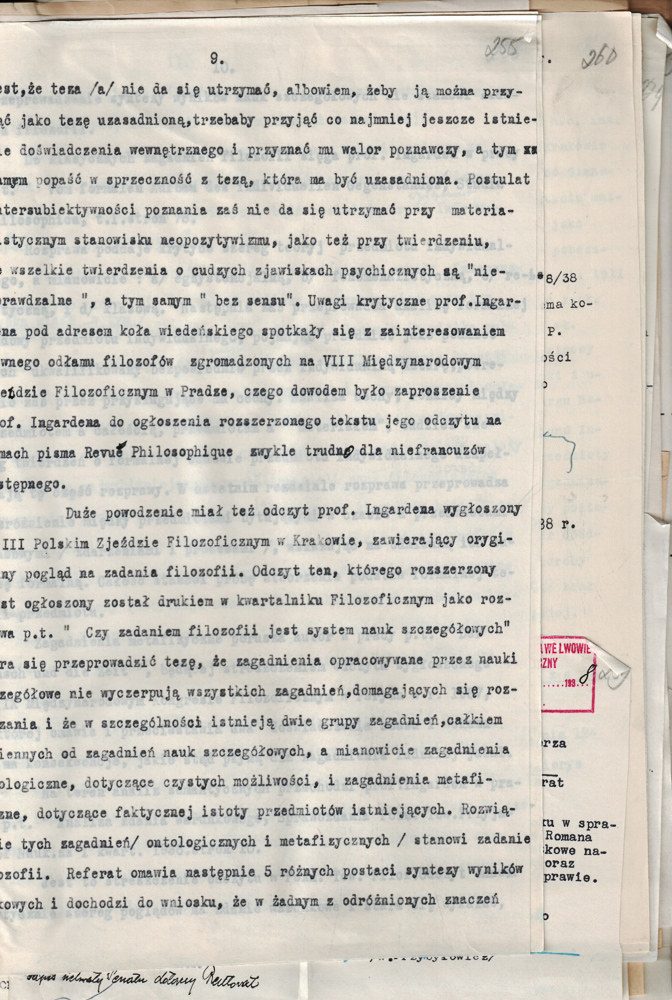
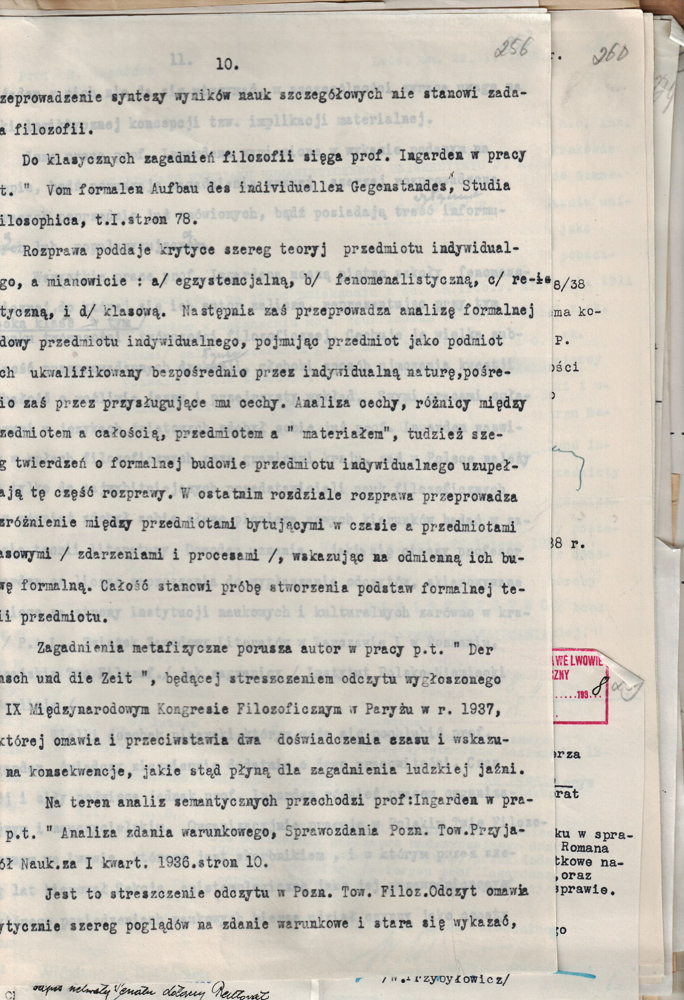
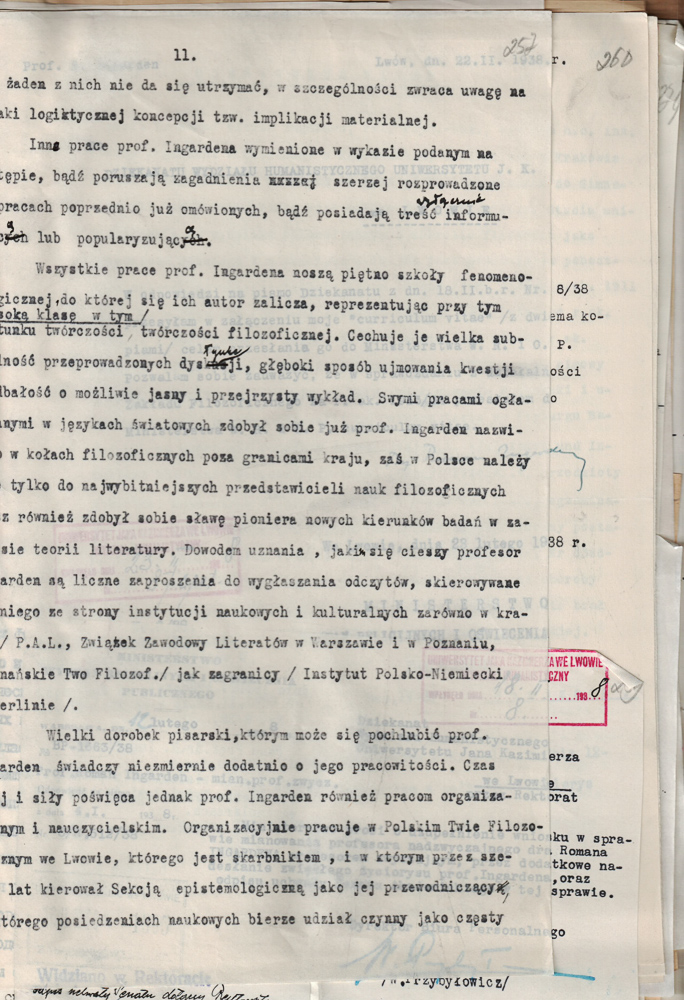

List of publications written 04.01.1937
DEAN
DEPARTMENT OF HUMANITIES v In Lviv, 4 January 1937
JAN KAZIMIERZ UNIVERSITY
IN LVIV
No. 8/38.
Re: the matter of promoting Prof.
Roman Ingarden.
To
THE MINISTRY
OF RELIGIOUS AFFAIRS AND PUBLIC EDUCATION
Dept. IV. BP-
v v v Warsaw.
v v v Professor Dr Roman INGARDEN, from the moment he was appointed as associate professor by order of the President of the Republic of Poland, 27 October 1933, no. BP-17667/33 (Rescript of the Ministry of R. A. and P. E. of 23/12/1933 no. BP-17667/33 -), has published 34 publications, including 1 book, 9 dissertations, 15 articles, 5 reports on his own lectures, and 4 reviews.
A list of these publication follows:
1) Review of E. Husserl, Formale u.[nd] transzendentale Logik [German: Formal and transcendental logic], Kantstudien [German: Kant Studies], 1933. p. 3.
2) Review of the 2nd edition, W. Witwicki, Psychologia [Psychology], Przyjaciel Szkoły [School Friend], Poznań, 1933, p. 2.
3) ‘Zagadnienie tożsamości dzieła muzycznego’ [Identity of a musical work], Przegl. Filozoficzny [Philosophical Review], Vol. XXXVI, Warsaw 1933, p. 43.
4) ‘O nazwach i słówkach funkcyjnych’ [On names and functional words] (report on his own work) Ruch Filozoficzny [Philosophical Movement], Vol. XII, p. 2.
5) ‘Verbum finitum a zdanie’ [Verbum finitum {Latin: verb indicating person and number} and the sentence] (report on his own work), Ruch Filozoficzny [Philosophical Movement], Vol. XII, p. 2.
6) ‘Zadania kulturalne inteligencji w dobie obecnej’ [Present-day cultural tasks of the intelligentsia], Wiadomości literackie i muzyczne [Literary and musical news], Lviv, 1934, p. (approx.) 3.
7) ‘Der logistische Versuch einer Neugestaltung der Philosophie’ [German: The logistical effort to reshape philosophy], lecture at the 8th Philosophical Congress in Prague, p. 7.
8) ‘Edmund Husserl, twórca fenomenologii’ [Edmund Husserl, the founder of phenomonology], Wiadomości literackie [Literary News], no. 568, Warsaw, 1934, p. (approx.) 11.
9) ‘Niektóre sprawy sporne współczesnej psychologii’ [Some disputed issues of contemporary psychology], Marchołt, Vol. 1. no. 1, p. 16.
10) ‘Jeszcze „atulli mirochłady”’ [‘Atuli mirochłady’ again {sic; evidently concerns Tuwim’s ‘Atuli mirohłady’}]. Wiadomości literackie [Literary news], no. 570, Warsaw, 1934, p. (approx.) 9.
11) ‘Vom formalen Sufbau des individuellen Gegnstandes’ [sic; Vom formalen Aufbau des individuellen Gegenstandes; German: On the formal structure of the individual object], Studia Philosophica, vol. I, Lviv, 1934, p. 78.
12) ‘VIII Kongres Filozoficzny w Pradze [8th Philosophical Congress in Prague]’, Pion [Vertical], issue 70.
13) ‘Człowiek i jego rzeczywistość’ [Man and his reality], Tydzień Polski [Polish week], No. 6.
14) ‘Logistyczna próba ukształtowania filozofii’ [The logistic attempt to shape philosophy], Przegląd Filozoficzny [Philosophical review], XXXVII, Warsaw, 1934, p. 8.
15) ‘„Monomachji humanistycznej” ciąg dalszy’ [‘Of humanistic monomachia’, continued]. Pion, no. 30, year III, Warsaw, 27/7/1935.
16) ‘L’assai logistique d’un refonte de la philosophie’ [French: The logistic attempt to reshape philosophy], Rev. Philos. [French: Philos. Rev.], 60th year, nos. 7/8, Paris, 1935, p. 23.
17) ‘Główne tendencje neopozytywizmu’ [The main tendencies of neo-positivism], Marchołt, issue V, p. 15.
18) ‘Poznanie’ [Cognition], Świat i życie [World and Life], vol. IV, issue 2, Lviv, 1936, p. 10.
19) Review of a book by Ewald Vollhard, Zwischen Hegel und Nietzsche [Between Hegel and Nietzsche], Kantstudien [Kant Studies], undated, XL, p. 1.
20) ‘Formy poznawania dzieła literackiego’ [Forms of cognition of the literary work], Księga Referatów Zjazdu naukowego im. Krasickiego [Book of Papers, Krasicki Academic Congress], Lviv, 1936, p. 30.
21) ‘Racjonalizm’ [Rationalism], Świat i życie [World and Life], vol. IV, issue 3, p. 8, Lviv, 36.
22) ‘Kazimierz Twardowski’, Nowe Czasy [New Times], Lviv, no. 42 (15/5/1936).
23). ‘Teoria poznania’, Świat i życie [World and Life], vol. IV, issue 7, p. 13, Lviv, 36.
24) ‘Rola logiki przy nauczaniu matematyki w szkole średniej’ [The role of logic in teaching mathematics in middle school], Muzeum [Museum], vol. LI, issue 2, p. 17.
25). ‘Analiza zdania warunkowego’ [Analysis of the conditional sentence], Sprawozdanie Pozn. Tow. Przyj. Nauk. [Proceedings of the Poznań Society of the Friends of Learning] no. for the first quarter, 1936, Poznań, p. 10.
26) O poznawaniu dzieła literackiego [The Cognition of the Literary Work of Art], Lviv, Ossolineum, 1937, pp. VIII and 274.
27) ‘Czy zadaniem filozofii jest synteza wyników nauk szczegółowych?’ [Is the synthesis of the results of particular sciences the task of philosophy?] Comm. III, Polish Philosophical Congress, p. 4.
28) ‘Czy zadaniem filozofii jest synteza wyników nauk szczegółowych?’ [Is the synthesis of the results of particular sciences the task of philosophy?] Kwartalnik Filozoficzny [Philosophical Quarterly], vol. XIII, issue 3, p. 20.
29) Review of a book by W. Grebe, Geist und Sache [German: Mind and Matter]. Nauka Polska [Polish science or Polish Learning], vol. XXII, p. 4, Warsaw 1937.
30) ‘Sprostowanie (odpowiedź J. Krzyżanowskiemu)’ [Rectification (reply to J. Krzyżanowski)], Nowa Książka [The new book], vol. IV, issue 4, p. 1.
31) ‘O t. zw. prawdzie w literaturze’ [On so-called truth in literature], Przegląd Współczesny [Contemporary review], June–July 1937, p. 35.
32) ‘Der Mensch und die Zeit’ [German: Man and time], a paper delivered at the 9th International Congress of Philosophy in Paris, Paris, Hermann-Co, 1937, p. 7.
33) ‘Wandlungen in der philosophischen Atmosphäre in Polen’ [German: Changes in the philosophical atmosphere in Poland], Slavische Rundschau [German: Slavic review] 1937, issue IV, p. 9.
34) ‘O psychologii i psychologizmie w nauce o literaturze’ [On psychology and psychologism in teaching about literature], Pion [Vertical], August 1937.
v Prof. Ingarden’s main paper from this period, bearing the title O poznawaniu dzieła literackiego [The Cognition of the Literary Work of Art] raises topics bordering on philosophical sciences and literary theory. This book constitutes a kind of supplement to the book Das literarische Kunstwerk [The Literary Work of Art] (1931). It consists of an Introduction, five chapters, and an Appendix.
v Chapter I analyses the experiences that constitute the cognition of a literary work, and in particular distinguishes a) perception of literary characters/signs and words, b) comprehension of the meaning of words and the sense of sentences, c) XXX as a transition from intentional states of affairs to XXX presented in the literary work, d) concretisation of these XXX, e) updating and concretisation of appearances, and, finally, XXX of the layers of the literary work in its entirety and grasp of its XXX. The author then proceeds to the question of how the complexity XXX of a literary work influences the form of its concretisation. The multitude and variety of experiences through which we perceive the work means that we do not live equally actively in all of them, or fulfil them with equal importance. As a result, various details of the work emerge in particular layers and stages of concretisation in more or less distorted form.
v Since a literary work extends from beginning to end, it exhibits a special sequence of succession of its parts, and thus must be read in a temporally extended process. In this respect, however, the shaping of the work’s concretisation is influenced by various temporal perspectives, to the analysis of which the main arguments of the second chapter are devoted. The work XXX through a system of ‘temporal appearances’, which cannot be eliminated from the essence of cognition of the work or of itself. Therefore, the literary work is characterised by particular transcendence in relation to both the multitude of conscious acts experienced while reading and the temporal appearances in which it presents itself to the reader.
v The considerations (of Chapter III) concern the differences between the cognition of a literary work and of a scientific work, whereby the latter proves less complex than the former, for cognition of scientific work is equivalent to faithfully and sufficiently understanding its ‘content’ or the meaning of the statements contained therein.
v In Chapter IV, a distinction is made between three types of cognition of a literary work, namely, a) pre-aesthetic cognition, b) the aesthetic literary experience in which the literary aesthetic object is constituted, and c) cognition of this object. Serving as the basis for this distinction is, first and foremost, analysis of aesthetic experience in general, which leads to the following assertions: the aesthetic experience includes a number of XXX whose passive-perceptive processes are intertwined with XXX cognitive and emotional products. The so-called ‘introductory emotion’ of the reader/viewer is evoked in his or her individual aesthetic attitude, leading to the constitution of the aesthetic object as a purely qualitative XXX. In its final stages, it constitutes an experience of aesthetic values and culminates in the acknowledgment or denial of these values. A literary aesthetic experience constitutes a special kind of general aesthetic experience. Therefore, it is impossible to agree to the ‘separation’ of aesthetics demanded by Tatarkiewicz.
v The pre-aesthetic investigation of a literary work, conducted with the conscious exclusion of the reader’s emotional reactions, on the basis of textual analysis, leads to its reconstruction (as opposed to its concretisation) as a schematic XXX, including indeterminate places which are filled in by the concretisation of the work.
v Investigation of the aesthetic concretisation of a work constituted in an aesthetic experience takes place on the basis of this experience, leading ultimately to the acquisition of a system of judgments about a given aesthetic concretisation of the work, namely, to a) descriptive-reporting and b) value judgments, the set of which constitutes XXX of a given aesthetic object.
v Whereas the arguments offered to this point were descriptive-epistemological, the final Chapter V sets itself the task of preparing the ground for the solution of critical-epistemological problems of the cognition of a literary work. It limits itself to specifying a number of basic critical-epistemological concepts in relation to a) pre-critical cognition of a literary work, b) critical literary experience, and c) study-related aesthetic knowledge of the critical concretisation of a literary work, as well as to the formulation of certain critical-epistemological issues of differentiated forms of cognition of a literary work and its concretisation.
v The Appendix discusses the object and the tasks of knowledge of literature; XXX a) the philosophical ontology of a literary work, b) the study of literature in two of its sections, i.e. descriptive and historical research and literary criticism, and outlines the issues of differentiated departments of knowledge of literature.
v The dissertation entitled ‘Formy poznawania dzieła literackiego’ [Forms of cognition of a literary work], published in the Book of Papers of the Krasicki Congress, constitutes an abridged version of the first two chapters of the above-mentioned book.
Both of the works discussed above met with lively interest from literary theorists. The proof of this is the fact that 13 reviews and detailed critical studies appeared within several months of the appearance of this book.
v Included in the same field as the book O poznawaniu dzieła literackiego [On the Cognition of the Literary Work of Art] are the issues raised in the article entitled ‘O t. zw. prawdzie w literaturze’ [On so-called truth in literature], in which the author, polemicising against Dr Borowy, attempts to show that no adjudicating sentences appearing in a literary work possess the character of issued judgments. The dissertation entitled ‘Zagadnienie tożsamości dzieła muzycznego’ [Identity of a musical work] also involves the field of objective aesthetics. This dissertation elaborates a number of issues constituting preparation for the issue mentioned in its title. Namely, it makes a basic distinction between a) a musical work and its XXX, b) a musical work and the experiences of its creator or listener, c) a musical work and its score. The last chapter is devoted to the analysis of essential moments in the construction of a musical work, and in particular its particular temporal form. It also attempts to show that a musical work is not a real object and that it is fundamentally different from the sonic creations found in nature and from acoustic XXX. This work introduces conceptual distinctions of great importance for the aesthetics of music.
v The dissertation entitled ‘Niektóre sprawy sporne we współczesnej psychologii’ [Some disputed issues of contemporary psychology], Marchołt, issue 1, p. 16, is also synthetic and critical in character. This article, sketching the development of psychology since the mid-nineteenth century, indicates the existence in contemporary psychology of a divergence of views on fundamental issues: a) as to defining the object of psychological research, b) in understanding of the basic properties of mental life. Differences in the definition of the object of research lead to different directions in psychology: to a) experiential psychology (psychological phenomenalism), b) psychology of the soul or spirit (psychological realism), and c) behavioural psychology. Different understandings of the fundamental properties of mental life are expressed in the opposition 1) between atomistic-associative psychology and the psychology of character, 2) between psychological dualism and various forms of its opposition. Having stated these facts, the article comes out against the dogmatic application of psychological theorems to practical issues. in particular to pedagogy. – This warning should be welcomed with appreciation.
v A series of dissertations devoted to criticisms of XXX views, as stated by representatives of the so-called ‘Viennese circle’ in an early phase of its creative activity, takes the character of a polemic. This criticism is contained primarily in a dissertation entitled ‘L’assai logistique d’une refonte de la philosophie’ [The logistic attempt to reshape philosophy] (a summary of this work was published in German XXX the 8th International Philosophical Congress in Prague), XXX in Polish in Philosophical Review as well as an article entitled ‘Główne tendencje neopozytywizmu’ [Main tendencies of neo-positivism] (Marchołt, from part V).
v The content of the first of these papers is as follows. Due to the identification by neo-positivism of the sense of the sentence with its verifiability and the thesis that the sentence can be verified only by assigning it indirectly relevant data derived from sensual perception, the dissertation poses the question of whether so-called metalogical sentences (i.e. sentences about sentences), the determination of which is supposed to be the only task of philosophy, are, according to the assumptions of neo-positivism, verifiable and thus meaningful. After considering a series of questions related to this central issue, the dissertation comes to the conclusion that, according to the assumptions of neo-positivism, metalogical sentences would be either unverifiable, and thus ‘senseless’, or they would state something about sentences incompatible with their basic characteristics, or, finally, they would constitute ‘sense smuggling’, which neo-positivism wants to rule out. If, however, this result is to be avoided, it is necessary to a) differentiate the sense of a sentence from its verifiability, b) agree that the sense of the sentence is not perceptible by means of the senses, and thus charge the basic thesis of neo-positivism with the fact that only one science exists, i.e. natural science, all of whose declarations can be expressed in the language of XXX or at least reduced to sentences formulated in this language.
v The article entitled ‘Główne tendencje neopozytywizmu’ [The main tendencies of neo-positivism] attempts to show that neo-positivism, despite its emphasis on the promulgated slogan of the senselessness of all metaphysics, is itself extremely materialistic metaphysics. In connection with this, the article weighs a) the correctness of the neo-positivist thesis that there is only one form of experience, namely sensory experience, and b) the potential for upholding the postulate of the intersubjectivity of cognition. As a result of the critical considerations in the article, thesis a) cannot be maintained, since, in order to be able to accept it as a justified thesis, it would be necessary to accept at least the existence of internal experience and to assign it cognitive value, and thus fall into contradiction with the thesis to be justified. The postulate of the intersubjectivity of cognition cannot be maintained along with either the materialistic position of neo-positivism or the statement that all statements concerning mental phenomena in others are ‘unverifiable’ and thus ‘meaningless’. Prof. Ingarden’s critical remarks directed towards the Viennese Circle met with interest from a certain faction of philosophers gathered at the 8th International XXX [Congress of] Philosophy in Prague, as evidenced by the invitation extended to Prof. Ingarden to publish an expanded text of his lecture in the pages of the journal Revue Philosophique [French: Philosophical review], which is usually difficult for non-French individuals to access.
v A lecture delivered by Prof. Ingarden at the 3rd Polish Philosophical Congress in Cracow, containing an original view on the tasks of philosophy, also achieved great success. This lecture, the expanded text of which was published as a dissertation in Philosophical Quarterly under the title ‘Czy zadaniem filozofii jest system nauk szczegółowych’ [Is the synthesis of the results of particular sciences the task of philosophy?] attempted to put forward the thesis that the issues elaborated by particular sciences do not exhaust all issues demanding solutions, and that, in particular, there are two groups of issues that are quite different from those of particular sciences, namely, issues of XXX regarding pure possibilities, and metaphysical issues regarding the factual essence of existing objects. The solution of these (ontological and metaphysical) issues is the task of philosophy. The paper then discusses 5 different forms of synthesis of scientific results and arrives at the conclusion that the synthesis of results of particular sciences is not the task of philosophy in any of these meanings.
v Prof. Ingarden refers to the classic issues of philosophy in a paper entitled ‘Vom formalen Aufbau des individuellen Gegenstandes’ [On the formal structure of the individual object], Studia Philosophica, vol. I, p. 78. The dissertation criticises a number of theories of the individual object, namely: a) existential, b) phenomenalist, c) XXX, and d) class-based. Then, he carries out an analysis of the formal construction of the individual object, comprehending the object as an entity XXX qualified directly by its individual nature and indirectly by its qualities. Analysis of a quality, the difference between the object and the whole, the object and the ‘material’, and a series of statements about the formal construction of an individual object complete this part of the dissertation. In the last chapter, the dissertation distinguishes between objects that exist in time and temporal objects (events and processes), indicating their different formal structures. The dissertation as a whole constitutes an attempt to create the foundations of a formal theory of the object.
v The author raises metaphysical issues in a paper entitled ‘Der Mensch und die Zeit’ [German: Man and time], a summary of a lecture delivered at the 9th International Philosophical Congress in Paris in 1937, in which he discusses and contrasts two experiences of time and indicates the resulting consequences for the issue of the human self.
v Prof. Ingarden proceeds to the field of semantic analysis in a paper entitled ‘Analiza zdania warunkowego’ [Analysis of the conditional sentence], Sprawozdanie Pozn. Tow. Przyj. Nauk. [Proceedings of the Poznań Society of the Friends of Learning], first quarter, 1936, Poznań, p. 10. This is a summary of a lecture at the Pozn. Phil. Soc. This lecture critically discusses a number of views on conditional sentences and attempts to show that none of them can be upheld; in particular, it calls attention to the shortcomings of the logistic concept of the so-called material implication.
v The other papers by Prof. Ingarden mentioned in the list provided in the introduction either raise issues more widely propagated in XXX papers already discussed, or are characterised by exclusively informative or popularising content.
v All of Prof. Ingarden’s papers bear the mark of the phenomenological school, to which their author belongs, while representing a high class within this genre of philosophical creativity. They are characterised by the great subtlety of the distinctions made, a profound manner of dealing with issues, and care in producing the clearest and most transparent lecture possible. His papers published in various world languages have won him a name in philosophical circles beyond the borders of our country, whereas, in Poland, he not only is one of the most eminent representatives of the philosophical sciences, but has also won fame as a pioneer in new directions in research in the field of literary theory. Serving as proof of the recognition enjoyed by Prof. Ingarden are numerous invitations to deliver lectures, addressed to him from scientific and cultural institutions both in Poland (P.A.L. [Polska Akademia Literatury, the Polish Academy of Literature], the Polish Writers’ Union in Warsaw and Poznań, the Poznań Philos. Soc.) and abroad (the Polish-German Institute in Berlin).
v The great literary achievements of which Prof. Ingarden can boast additionally testify immeasurably to his diligence. However, Prof. Ingarden also devotes his time and strength to his organisational and teaching work. He performs organisational work at the Polish Philosophical Soc. in Lviv, where he serves as treasurer, and where for several years he directed, as chairman, the Epistemological Section, at whose scientific meetings he takes part actively as a frequent speaker and one of the most active participants in discussions. An enormous amount of time and effort is expended by Prof. Ingarden, as a member of the organising committee of the journal Studia Philosophica (published in several world languages by the Pol. Philosophical Soc. in Lviv, and founded on his initiative), on the work associated with editing this publication.
v In the position of professor at our University, Prof. Ingarden has developed vital activities. His lectures and seminars enjoy outstanding attendance. The meetings of his higher Seminar devoted to aesthetic issues are attended not only by University students but also by the most eminent representatives of theorists of literature and art from the older generation. This Seminar has also won fame beyond Lviv.
v Based on the major academic achievements and taking into account the positive organisational and teaching activities of Prof. Roman Ingarden, the Council of the Department of Humanities of Jan Kazimierz University, at a presentation of the Philosophical Commission, which included professors K. Ajdukiewicz, Z. Czerny, J. Kleiner, M. Kreutz, E. Kucharski, and W. Podlacha, has unanimously adopted the following resolution:
v The Council of the Department of Humanities of Jan Kazimierz University asks the Ministry of Religious Denominations and Public Education to ask the President of the Republic of Poland for the appointment of Dr Roman INGARDEN, associate professor of philosophy, as full professor of this subject, with the same duties he has performed heretofore.
XXX with print
Stanisław Łempicki
Dean, Dept. of Humanities
